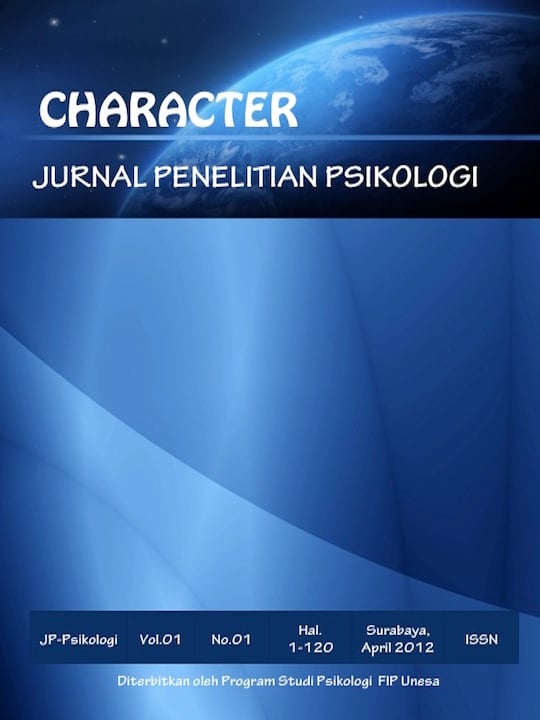PERBEDAAN PSYCHOLOGICAL CAPITAL GURU SEKOLAH DASAR DITINJAU DARI JENIS KELAMIN, STATUS PERNIKAHAN, DAN MASA KERJA
DOI:
https://doi.org/10.26740/cjpp.v8i8.41681Abstract
Abstrak
Pada masa pandemi saat ini tenaga pendidik yang salah satunya guru sekolah dasar mengalami tuntutan pekerjaan yang lebih berat karena perubahan sistem pembelajaran. Tujuan dari penelitian ini untuk mengetahui perbedaan psychological capital pada guru sekolah dasar negeri di Surabaya ditinjau dari jenis kelamin, status pernikahan dan masa kerja. Metode penelitian ini adalah penelitian komparatif. Penelitian ini adalah penelitian populasi dengan jumlah subjek sebanyak 70 guru sekolah dasar negeri. Alat pengumpulan data penelitian ini menggunakan skala psychological capital yang mengacu konsep dasar psychological capital milik Luthans, Youssef & Avolio yaitu self-efficacy, hope, optimism, dan resilience. Teknik analisa data yang digunakan yaitu Anova tiga jalur dan dibantu SPSS 25.0 for windows dalam perhitungannya. Hasil penelitian ini menunjukkan bahwa tidak ada perbedaan antara psychological capital guru sekolah dasar ditinjau dari jenis kelamin, status pernikahan dan masa kerja dengan nilai taraf signifikansi sebesar 0.827 (p>0.05). Selain itu, juga ditemukan bahwa tidak ada perbedaan antara psychological capital dengan jenis kelamin guru sekolah dasar yang memiliki nilai signifikansi 0.886 (p>0.05). Sedangkan jika ditinjau dari status pernikahan dan masa kerja ditemukan perbedaan yang signifikan antara psychological capital dengan status pernikahan dan masa kerja guru sekolah dasar yang memiliki nilai signifikasi 0.000 (p<0.05).
Kata Kunci: psychological capital, guru sekolah dasar, jenis kelamin, status pernikahan, masa kerja
Abstract
During the current pandemic, educators, one of whom is an elementary school teacher, have a more complicated job due to changes in the learning system. The purpose of this study was to determine the differences in psychological capital of public elementary school teachers in Surabaya in terms of gender, marital status, and years of service. This research method is comparative research. This study is a population study with several subjects as many as 70 public elementary school teachers. This research data collection tool uses a psychological modal scale that refers to the basic concepts of psychological capital belonging to Luthans, Youssef & Avolio, namely self-efficacy, hope, optimism, and resilience. The data analysis technique used is three-way Anova and assisted by SPSS 25.0 for windows in its calculations. This study indicates that there is no difference between primary school psychological capital teachers in terms of gender, marital status, and tenure with a significance level of 0.827 (p>0.05). In addition, it was also found that there was no difference between psychological capital and the gender of primary school teachers, which had a significance value of 0.886 (p>0.05). Meanwhile, when viewed from the marital status and period, found a significant difference between psychological capital with marital status and tenure of primary school teachers, which has a substantial value of 0.000 (p <0.05).
Keywords: psychological capital, elementary school teacher, gender, marital status, years of service
Downloads
Downloads
Published
How to Cite
Issue
Section
License
Authors who publish in this journal agree to the following terms:
Copyright in any article is held by the author.
The author grants the journal, publication rights with the work simultaneously licensed under a Creative Commons Attribution License that allows others to share the work with an acknowledgment of the work's authorship and initial publication in this journal.
Authors may enter into separate, additional contractual arrangements for the non-exclusive distribution of the journal's published version of the work (e.g., posting it to an institutional repository or publishing it in a book), with an acknowledgment of its initial publication in this journal.
Authors are permitted and encouraged to post their work online (e.g., in an institutional repository or on their website) prior to and during the submission process, as this can lead to productive exchanges, as well as earlier and greater citation of published work.
 Abstract views: 388
,
Abstract views: 388
, PDF Downloads: 305
PDF Downloads: 305





